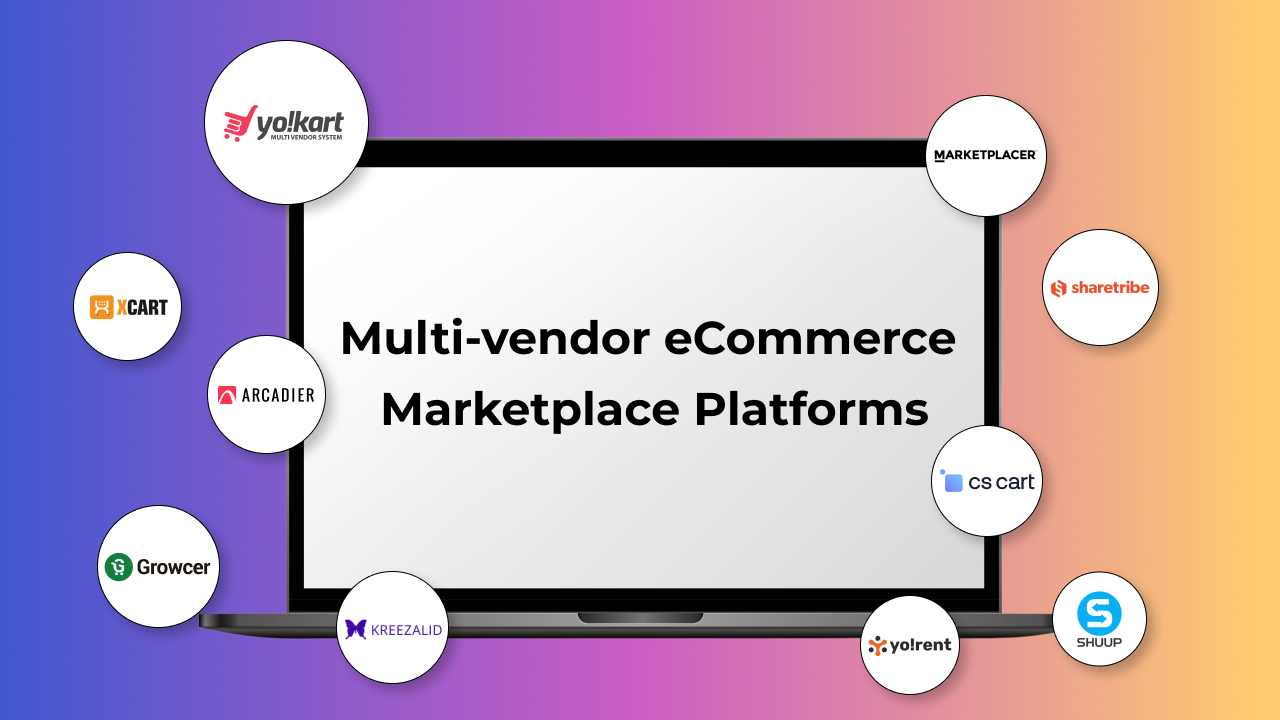Top 18 Multi-vendor eCommerce Marketplace Platforms to Start Online Business in 2024
Updated On: 3rd January 2024
According to Nasdaq, by 2040, 95% of all retail will take place online. However, if you go by the current market trend ÔÇò this could occur even sooner than anticipated. That can be expected as consumers, globally, are increasingly inclined to source more of their needs from eCommerce websites. Similarly, retailers see the value of digital sales channels as integral components of their sales strategy. They want to meet the consumers at their preferred channels.
The biggest beneficiary and catalyst of this need have been eCommerce marketplace websites. By giving both retailers and consumers a purpose-built space to interact and transact, they have emerged as pivotal players. Their success spurring a transformative shift in retail ÔÇò globally.
Naturally, more aspiring entrepreneurs by the day, are considering to capitalize on this trend, by starting with their marketplace website. And the best way to do so? Using a multivendor marketplace platform.
Let’s delve into the top multivendor marketplace platforms in this blog, exploring how they enable entrepreneurs to establish a robust presence in the online business landscape.
Table Of Contents
What is a Multi vendor Marketplace Platform and is it an Opportune Investment in 2024
A multivendor marketplace is an eCommerce website like Amazon or Etsy, where multiple sellers can sign-up to sell their products or services. Typically, the infrastructure and backend operations are the responsibility of the marketplace owner(s).
The following are the reasons why online marketplaces have been successful in generating both revenue and consumer interest over the years.
- The accelerated shift online for businesses – in line with evolving consumer preferences. B2B sellers are looking for online eCommerce channels to add to their sales strategies and reach consumers directly. Multivendor marketplace platforms give them the opportunity to add the much-needed online sales channel without the need for maintaining their own eCommerce stores.
- Benefits for all participants on the platform ÔÇô in a multivendor eCommerce platform, all participants have defined roles, hence they all have their individual gains from the platform. These are: multiple revenue streams for marketplace owners, an established ecosystem with customer footfall for the sellers, and multiple buying options for the consumers.
- A dynamic ecosystem that can scale rapidly ÔÇô Higher sales further paves way for more value to the end consumers. Sellers can feed off the success of each othersÔÇÖ product offerings. The owners have the potential to scale to global operations and add more value to the business by way of alliances and partnerships.
Given the lucrative opportunity, aspiring entrepreneurs can look for the best way to enter the eCommerce market. One of the better ways is using a multivendor marketplace solution.
A Multivendor marketplace software allows you to build a multi-vendor marketplace like Amazon or Etsy. These save business owners considerable web development time and resources.
Within themselves, there are many types of multivendor eCommerce software. Some can be SaaS-based with recurring subscription costs while some can be self-hosted with a one-time License fee. Discussed below are some of the leading solutions.
Best Multi-vendor eCommerce Marketplace Platforms to Start an Online Marketplace
To help you build a future-proof multi-vendor marketplace, we have listed the 18 best multivendor eCommerce platforms. These multi-vendor platforms are inherently designed to create an online marketplace and are also scalable and easy to customize. We reviewed these platforms based on their in-built feature list, trusted clientele, pricing, and rating on popular review sites (like G2, Capterra, & GoodFirms).
1. YoKart: Self-Hosted Multi vendor Marketplace Platform
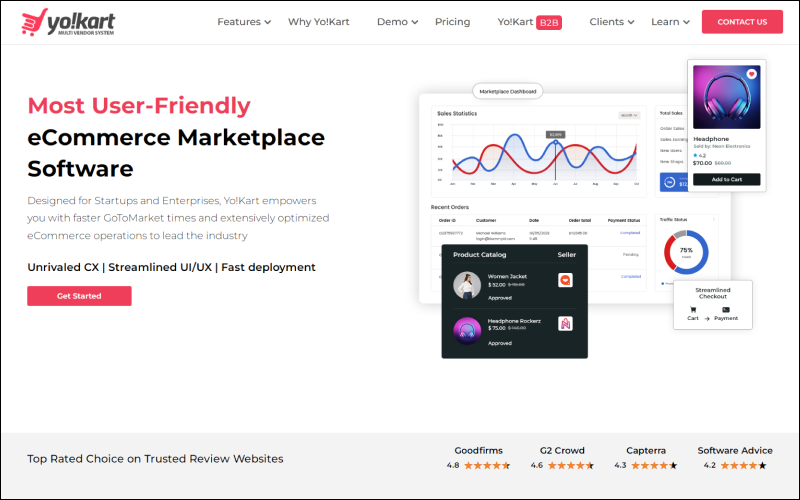
YoKart is one of the best multi-vendor eCommerce platforms the industry has. It is a powerful self-hosted eCommerce solution to build a Multi-vendor marketplace in the B2B, B2C, or P2P industries. Launched in 2015, it has been used by 5000+ businesses in 70+ countries. YoKart has all essential in-built features and multiple third-party integrations like ShipStation, TaxJar/Avalara, Stripe Connect, MSN Translator, MailChimp API, and more.
YoKart software allows vendors to set up their individual storefronts. It has dedicated user panels for the Admin, sellers, customers, affiliates, and advertisers. Also, the multi-vendor platform is fully responsive and comes with native buyer apps for iOS and Android platforms.
YoKart offers exclusive purpose-built solutions for the B2B and B2C marketplaces respectively. While YoKart is for B2C marketplaces, YoKart B2B allows entrepreneurs to launch a marketplace for B2B users. It has in-built features like Request for Quote (RFQ) module, Minimum order quantity, bulk price discounts, MOQ, part payments options, support for both services and products, and other B2B features that cater to specific B2B needs.
Moreover, carrying on with the endaevour to offer the latest in technology and features to its users, the latest version for YoKart – V10 now offers a completely refreshed UI, streamlined eCommerce workflows, multiple features, and additional integrations.
Key Features of YoKart multi-vendor eCommerce platform:
- Global product catalog System
- Single-page workflows and logic-driven UI for efficient operations management
- Order inventory management and customizable shipping management
- Progressive Web Apps (PWA) Compliance
- Supports global operations with robust scalable engine, Multilingual and Multi-currency
- Multiple payment gateway integrations including Stripe Connect for real-time split payment
- Multiple Payment methods (Payment gateways, e-Wallets, BOPIS, COD, and more)
- Abandoned Cart Management
- PCI-DSS and GDPR compliant
- Sell Digital and Physical products
- Result-oriented marketing features like Affiliate module, Discount coupons, and more.
- B2B eCommerce features
- Lifetime license and source code ownership
- Up to 1-year free technical support
YoKart Clients:
YoKart has more than 5000 clients in 70+ countries. The leading eCommerce solution has quickly grown into a proven & best multi-vendor software trusted by several small, mid-market businesses, and some Fortune 500 companies. The diverse clientele includes the worldÔÇÖs first diamond trading platform – UNI Diamonds, healthcare marketplace Procurenet by Gurbaksh Chahal, unique travel platform – Voyij, Digital products marketplaces like Regake, AmericasÔÇÖ B2B platform Bozinga, and many more.
YoKart Ratings:
YoKart has an overall rating of 4.3 on Capterra, 4.9 on Good firms, and 4.7 on G2 with reviews from clients worldwide. While most clients have applauded YoKart multi-vendor software for its extensive customizability, UI/UX, outstanding technical support, and affordable packages. The only real complaints are there for limited themes and time required to learn the system.
YoKart Pricing:
All YoKart versions are available for a lifetime of use by acquiring the License. The license is part of bundled packages, which are available for a fixed, one-time price. The pricing for YoKart packages starts at $1249 for Yo!Kart B2C and $1499 for YoKart B2B respectively. All the packages are self-hosted and include free installation, zero transaction fees, and complete source code ownership. They have been curated to cater to varying business needs.
Who should buy YoKart ÔÇô A Custom-Engineered Multi vendor Marketplace Platform
YoKart is a white-label multi-vendor eCommerce marketplace platform ideal for businesses who want:
- An intuitive user-interface with a satisfying user-experience.
- Complete control over e-commerce marketplace operations.
- Flexibility to easily modify or accommodate new changes in the marketplace.
- An extensive feature-rich multivendor ecommerce solution just under their budget.
- To hire a team that offers full support from the design development to the marketing stage.
Get a Complete Overview of All Essential E-commerce Features in Yo! Kart
2. Yo!Rent ÔÇô Multi-vendor eCommerce Marketplace Software

Yo!Rent is a multivendor e-commerce marketplace software built with high precision to provide entrepreneurs with the desired functionality to launch versatile eCommerce businesses. Operating in 70+ countries, Yo!Rent has helped thousands of entrepreneurs in materializing their business ideas all around the world.
To power enterprise-level businesses and deliver your eCommerce services in multiple countries, Yo!Rent is also fully scalable and comes with multilingual & multi-currency functionality. In terms of business scalability and growth accommodation, Yo!Rent has unlimited listings, transactions and user profiles, which make it an ideal solution to support your online marketplace idea from startup to enterprise level.
The latest version of Yo!Rent, Yo!Rent V3 also comes with industry-specific designs, which are expertly designed for heavy equipment, automobile and fashion industries. These designs come with niche-specific features and functionality, which make them a complete suit to launch a powerful eCommerce business in their respective industries.
Lastly, Yo!Rent is fully customizable to support any unique features and business preferences.
Key Features of Yo!Rent Multi-vendor Ecommerce marketplace Platform:
- Inventory management for real-time inventory automation
- Order management for after-sales business process management
- Request for Quote (RFQ) management for price negotiation and handling complex orders
- Returns and cancellations management for a high customer satisfaction rate
- Product comparison for decision making and improving customer experience
- Discount coupon management for introducing new discounts and setting up a reward points system
- Sales add-ons for upselling complementary goods and services
- Advanced booking calendar to accept rental orders
- Multi-currency and multilingual support
- 20+ payment gateways supporting cross-border operations
- One year of free technical support
Yo!Rent Clients:
Yo!Rent has assisted numerous entrepreneurs across the globe in launching resilient eCommerce marketplaces. For example, its client GearFlow, a heavy equipment platform was able to raise $1 million in seed funding. Aloklub, SpainÔÇÖs first online sports equipment rental marketplace was also developed by online rental software, Yo!Rent. Some other renowned clients of Yo!Rent are Kouture Studious, StageWing, Rentera, JC Lease, MaltaMarkt and more.
Yo!Rent Ratings:
Yo!Rent has received an overall rating of 4.5 on G2, 5.0 on SourceForge and FinancesOnline and 81% score on Comparecamp.com. The platform has been praised for its after sales service, user-friendly dashboard and the wide range of features. Some clients have shared in online reviews that the software has the steep learning curve.
Yo!Rent Pricing: Currently, Yo!RentÔÇÖs pricing is only available on quotation basis. Interested entrepreneurs can get in touch with Yo!RentÔÇÖs official team to get their quote.
3. CS-Cart: Self Hosted Multi-vendor Software
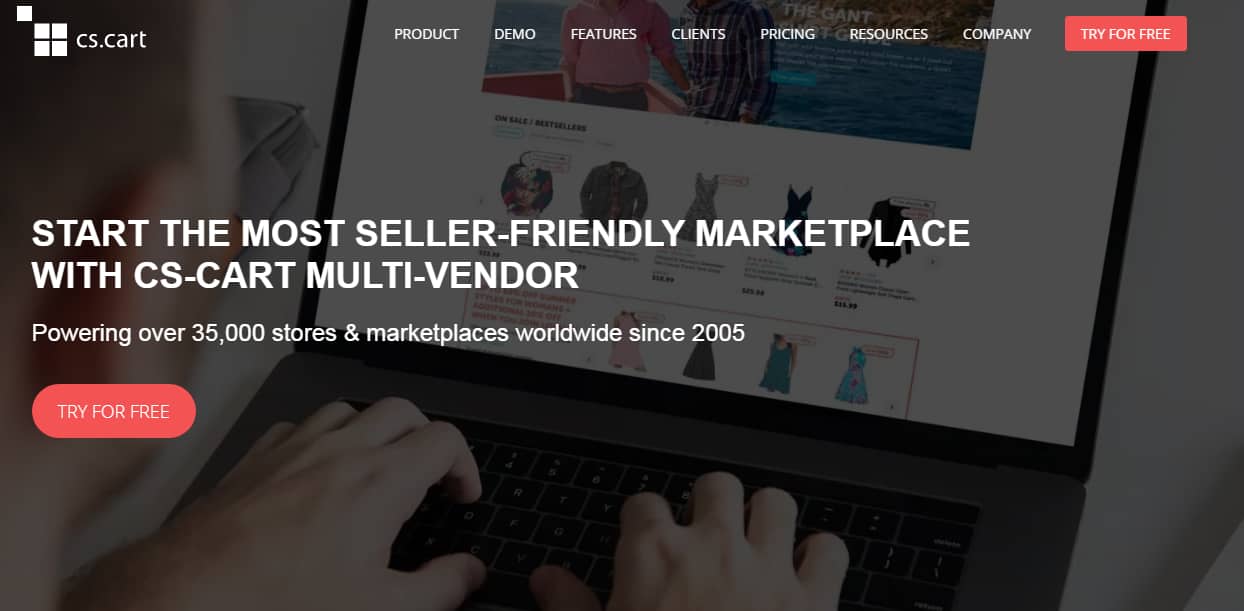
CS-Cart is a widely used multi-vendor eCommerce platform to build an online marketplace. The platform is self-hosted and comes with many essential e-commerce features, such as a vendor payout system, an advanced order management system, multiple storefronts, and more. However, some of these features are not available in the lower-priced packages of the solution.
There is an app store where you can find and integrate several add-on modules and integrations such as Facebook Conversion API, Live currency converter, advanced Mailchimp, and others. These can come with additional costs, depending on the package you opt for.
Key Features of CS-Cart multi-vendor software:
- Real-time shipping rate estimates
- Regular updates and enhancements
- Secure self-hosted solution with GDPR compliance
- Multi-store management
- Customizable vendor storefronts
- Advanced admin and seller panel
- Configurable vendor monthly subscription plans
- 45 days free technical support
CS-Cart Clients:
More than 1,300 online marketplaces globally, run on CS-Cart multi-vendor ecommerce marketplace solution. ShopClues is one of the renowned clients they have.
CS-Cart Rating:
It has received an overall rating of 4.7 on Capterra and 4.8 on G2, with clients praising CS-Cart for its third-party tools and regular updates.
But, there have been regular complaints about the limited and paid tech support. User experience is proven to be poor with low add-ons quality. Also, the license pricing is expensive and bulk import capability is clunky.
CS-Cart Pricing:
The pricing starts at $1250/year for the basic package. There are mobile apps for iOS and Android platforms, although these apps are only available for multi-vendor plus (at $3150/year) and multi-vendor ultimate edition (at $6950/year) albeit at a much higher price than what youÔÇÖll get at YoKart.
Learn In-depth Difference Between Yo!Kart And Cs-Cart
4. Shuup: Open Source Multi-vendor Ecommerce Marketplace Platform
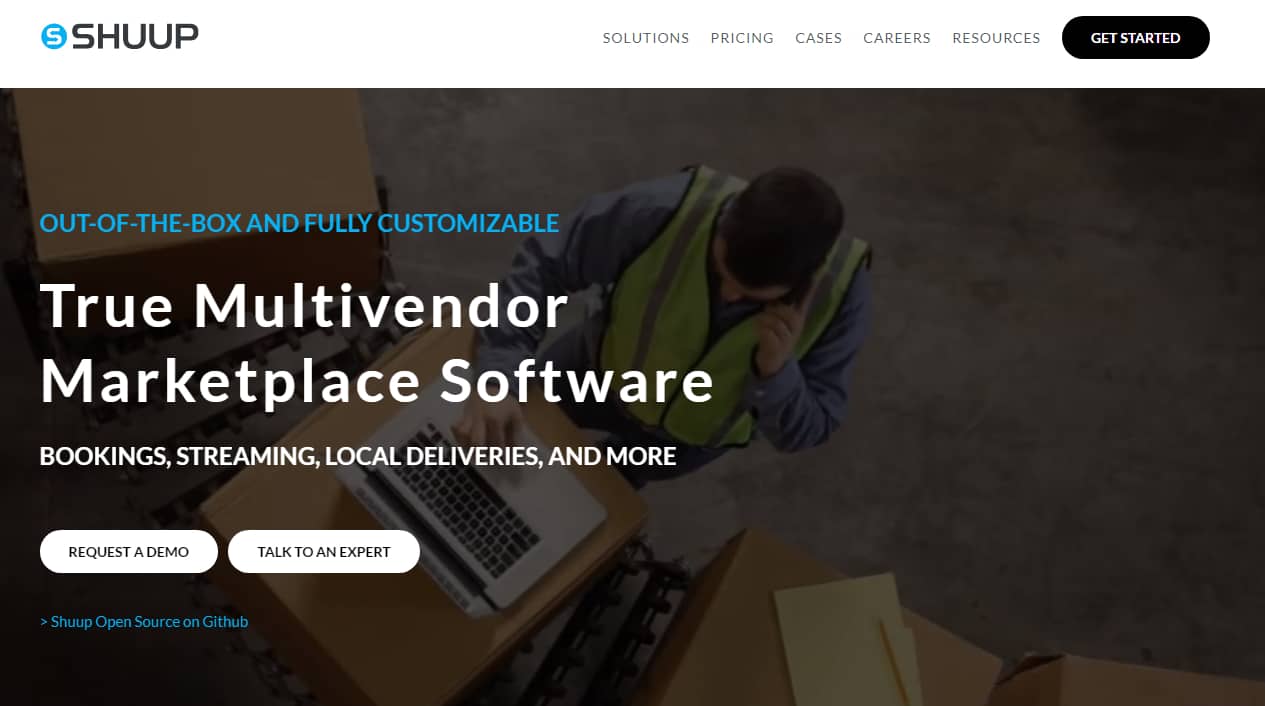
Shuup is a fully customizable open-source multi-vendor solution to start an online marketplace. It is an innovative multi-vendor e-commerce platform designed to build both horizontal marketplaces like Amazon as well as vertical marketplaces such as Airbnb. The multi-vendor eCommerce platform comes with features like data migration, cross-selling, tax management, inventory tracking system, order management, and more. It has a centralized dashboard for the admin to manage product listings, shipping methods, check sales reports, and more.
Key Features of Shuup Multi-vendor Platform:
- Built-in layout editor to customize the feel and look of the marketplace
- Fully responsive design for consistent user experience (UX) across all devices
- Complete content management system (CMS)
- Freedom to personalize individual vendor storefronts
- Easy to Customize as per business requirements
- Built-in Paypal and Stripe payment gateways
- Open-source API to integrate third-party payment processors freely
Shuup Clients:
Since its inception in 2014, Shuup has delivered niche-specific marketplaces like pharmacy retailer network, B2B workwear marketplace, Gaming hardware marketplace, and more for clients around the world. However, the company has not mentioned how many clients are using the software.
Shuup Ratings:
Shuup marketplace software has a rating of 4.3 on Capterra and 4.8 on G2 where clients appreciate the platform for its extreme flexibility, custom integrations, and support.
But, there are often complaints as well regarding the difficulty of the platform usage, issues with generating coupons, and frequent bugs. Furthermore, an additional fee is charged to get another language plus the translations are cumbersome.
Shuup Pricing:
Unlike YoKart or Cs-Cart, Shuup has higher pricing & works on a monthly billing model. It comes in two distinct pricing packages ÔÇô $299/month for the SaaS license and $1499/month for a self-hosted license. Although native mobile apps can be developed with ShuupÔÇÖs open source license, there are no ready-to-use mobile apps available.
5. Sharetribe: SaaS Multi-vendor Software
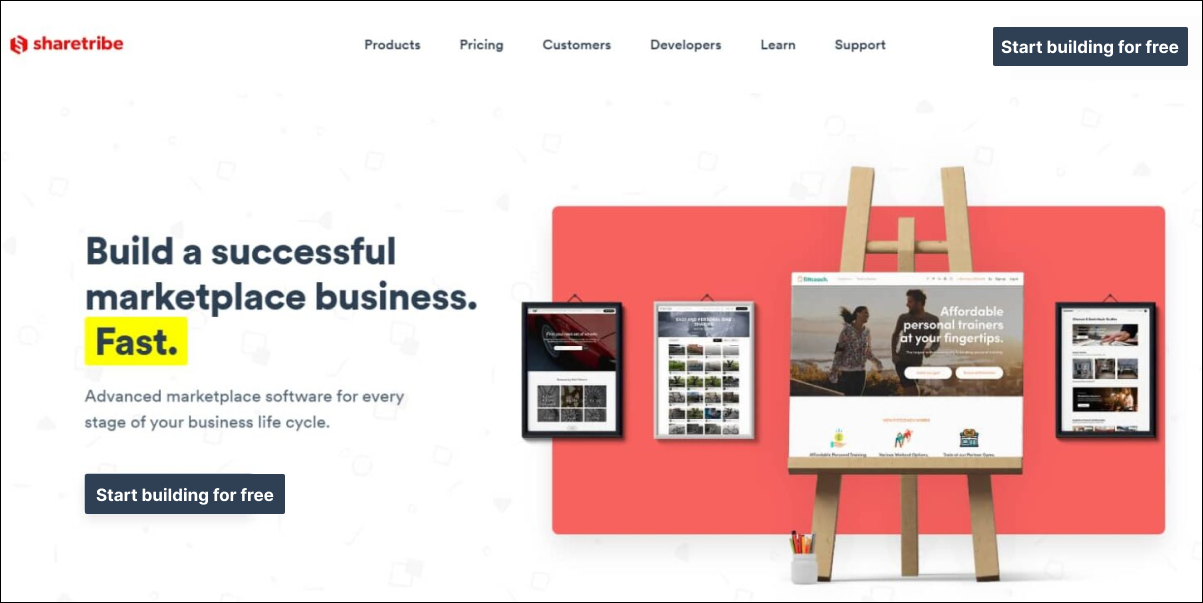
Sharetribe is a cloud-based e-commerce platform designed to build custom multi-vendor marketplaces with ease. It is a hosted marketplace solution with a subscription-based model for businesses to start their multi-vendor store. Sharetribe has two products ÔÇô Sharetribe Go and Sharetribe Flex. While the latter allows businesses to build a customized online marketplace using powerful APIs, the former ÔÇô Sharetribe Go is a marketplace platform that delivers a scalable online multi-vendor marketplace without coding.
Key Features of Sharetribe Multi-vendor Platform:
- In-built product catalog management system
- Advanced payment system with support for over 25 currencies and 200+ countries
- Fully responsive to all devices and screen size
- A hosted solution to maintain and scale your e-commerce business
- Individual profiles for users (buyers and sellers)
- Social sign up for users
- SEO tool to optimize your marketplace
- Powerful customization tools to scale your business
Sharetribe Clients:
Sharetribe is powering around 1,100 marketplaces in 70+ countries since 2011. It is an excellent solution for small to medium-sized businesses.
Sharetribe Ratings:
It has a rating of 4.4 on Capterra and 4.5 on G2. Sharetribe is an easy-to-use platform, customizable using front-end development, and offers excellent customer support according to client reviews.
There are a few complaints as well, like a lack of ready-to-use APIs, limited marketing features, and only two payment gateways (Stripe and PayPal). The design features for enhancing the platformÔÇÖs aesthetic appeal are limited with extra charges for landing page customization.
Sharetribe Pricing:
Sharetribe Go comes with 4 recurring packages: Hobby at $99/month, Pro at $149/month, Growth at $199/month, and Scale at $299/month. Plus, thereÔÇÖs a 30-day free trial available. All packages include unlimited traffic, marketplace listings, and transactions. Currently, Sharetribe does not offer iOS, Android, or any other mobile apps. However, the $99/month plan comes with Sharetribe Branding.
Sharetribe Flex plan pricing starts from $299/mo (subscription fees). Also, transaction fees are applicable if the monthly transaction volume is above 30K.
6. Magento Multi-vendor Marketplace Solution by CedCommerce
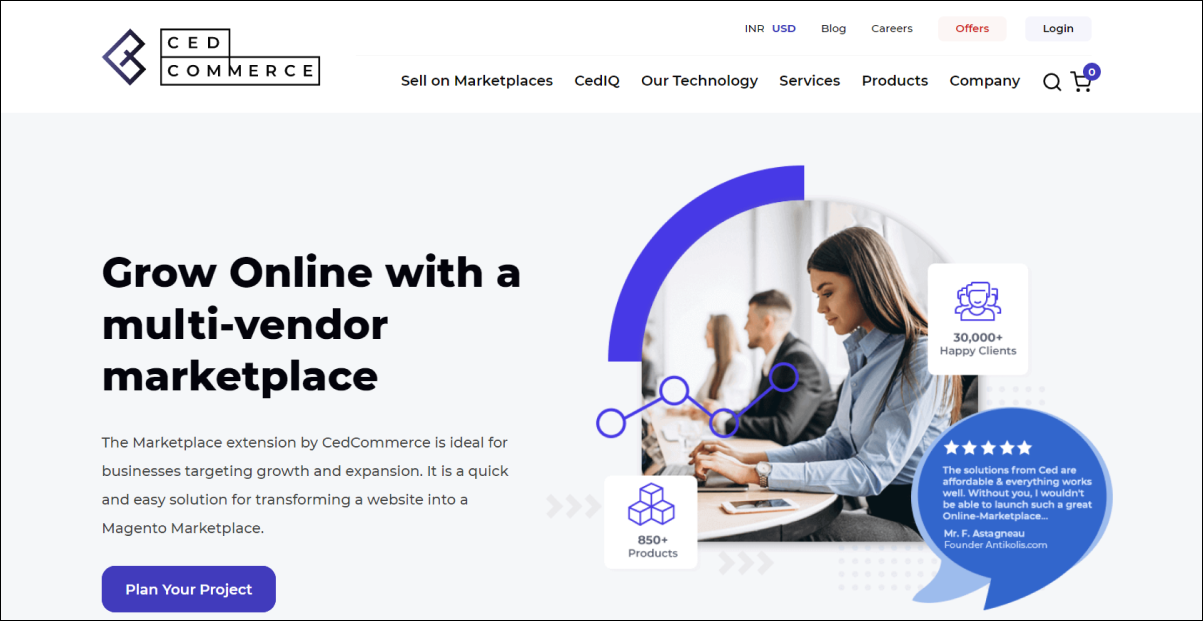
Magento 2 Multi-Vendor Marketplace solution by CedCommerce is a one-stop solution for aspiring entrepreneurs to build a multi-vendor marketplace website. This would enable the coming together of vendors on a common platform to market their products, showcase their vendor profile, manage orders from their dedicated vendor dashboard, and view sales reports. The Multi-Vendor Marketplace solution for Magento offers a multitude of features for transforming your Magento eCommerce website into a workable and feature-rich multi-vendor store like Amazon and eBay. With the help of this Magento multi-vendor solution, vendors owning Magento 2 stores can create a website tailor-made to their specific business requirements.
Key Features of CedCommerce Multi-vendor Platform:
- Facilitating Online B2B and B2C marketplace: Create Magento 2 multi-vendor marketplace for B2B and/or B2C needs, which enable businesses to be both sellers and customers.
- Leveraging Mobile Commerce: Your Magento 2 multi-vendor marketplace will be mobile-friendly.
- Local Courier Support: Magento 2 marketplaces built to support well-known courier services like FedEx, Aramex, UPS, etc.
- Offer Headless PWA marketplace.
- Support multiple Payment Methods: Extend payment alternatives on your Magento 2 marketplace with support for services like PayPal adaptive, Stripe connect, PayPal marketplace, etc.
CedCommerce Clients:
CedCommerce Magento marketplace solution is a reliable multi-vendor eCommerce platform with clients across the globe. Antikolis, MyMall, Rack Tribe, Purple Box, Vajor, Wafi Apps, Univar Solution, Oneagrix, Expressgrass are some examples.
CedCommerce Ratings:
CedCommerce has a rating of 4.6 on G2 and 4.9 on Trustpilot platform. These ratings are for CedCommerce eCommerce services as a whole.
An extra fee is charged for support, custom development, upgrades, and integrations. Further, it requires coding skills to use the complex software equipped with 20,000 files.
CedCommerce Pricing:
Pricing for CedCommerce Magento marketplace extension comes in 3 tier pricing strategy for solutions ranging from $60 CE ÔÇô $1600 CE. Additional Enterprise/Commerce editions are available over and above these packages ranging $100 ÔÇô $1000, depending upon the chosen solution.
7. Growcer: Self Hosted Multi-vendor Platform

Growcer is a robust on-demand multi-vendor platform to start a hyperlocal marketplace. It is a readymade multi-vendor eCommerce solution that comes with all essential e-commerce features, such as a product catalog system, commission management, tax management, order tracking, click-and-collect, PWA, and more. Growcer is a highly customizable and scalable solution to start e-pharmacy, liquor, dairy products, pet food, board games, and a variety of other hyperlocal online marketplaces.
Key Features of Growcer Multi-vendor Platform:
- Readymade buyer & delivery apps
- Fully customizable platform to build a personalized grocery marketplace
- Individual vendor storefronts, easily personalized
- Separate dashboards for admin and sellers
- Full-fledged in-built CMS
- Streamlined delivery management system
- Multiple revenue models for the admin
- Free 12-months technical support and more
Growcer Clients:
Growcer has marked a significant position in the list of best multi-vendor software trusted by 200+ clients worldwide in such a short duration. The clientele comprises ShopExpres, Superkiwi, Tap Retail, and many more. It is ideal for entrepreneurs as well as enterprises to start online grocery & other hyperlocal marketplaces.
Growcer Ratings:
Growcer has capped a rating of 4.6 on G2 and 4.9 on Capterra with reviews from clients across the globe. This software is applauded by many for its easy third-party integrations, extensive customizability, and affordable packages. The only real complaint is that first-time users need to invest time to learn the system.
Growcer Pricing:
Growcer offers one-time license fee with no transaction charges or recurring fees of any kind. Also, you get complete source code ownership, free installation, and 12-months of free technical support. Growcer has readymade buyer and delivery staff apps for iOS and Android platforms.
8. Kreezalid – SaaS Multi-vendor Platform
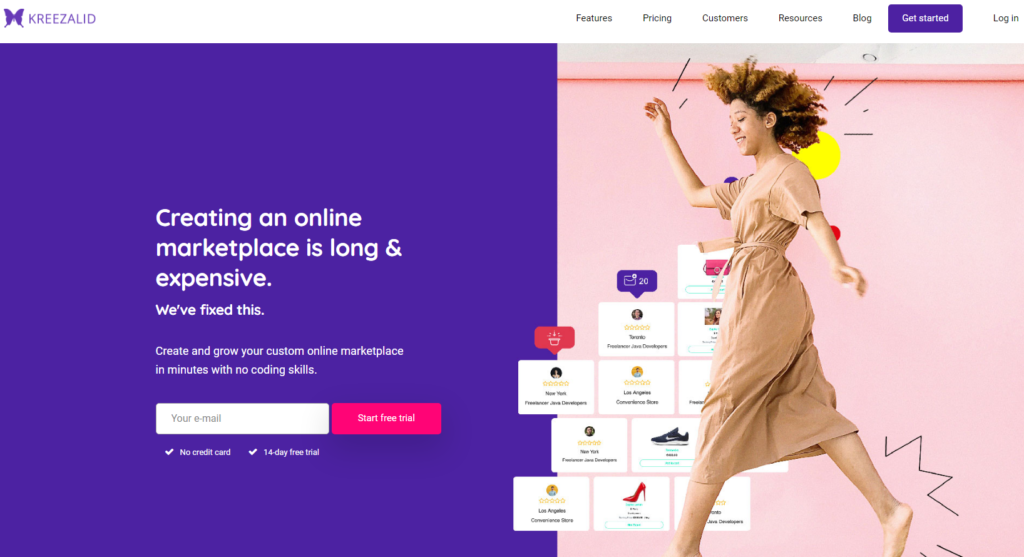
Kreezalid is a SaaS-based multi-vendor platform to build a customized e-commerce marketplace. The solution is integrated with powerful e-commerce features to enable business owners to quickly scale their online marketplace. Kreezalid is intuitively designed, mobile-friendly, and has a plugins library to integrate new functionalities streamlining the entire marketplace operations.
Key Features of Kreezalid multi-vendor platform:
- An official partner of Stripe Connect and Mangopay ÔÇô two in-built payment gateway integrations.
- Streamlined tax management and shipping module management.
- An app store to find and add new features, services, and plugins to the marketplace.
- In-built SEO and digital marketing tools to increase search engine visibility.
- Integrated analytics system and quick access to Google Analytics.
- Kreezalid is available in English, Spanish, French, and Danish languages.
- In-built modules for user management and listing management.
Kreezalid Clients:
Kreezalid is a reliable multi-vendor e-commerce platform with clients across the globe. The solution is ideal for startups as well as enterprises.
Kreezalid Ratings:
It has a rating of 4.2 on Capterra and 2.3 on G2. Kreezalid offers an intuitive user interface, excellent admin panel, and allows selling digital products ÔÇô as shared in the client reviews.
But, the multi-vendor eCommerce software lacks UI/UX and essential features/integrations. Also, the client highlighted the limited personalization options, payment gateway choices, and lack of customer support.
Kreezalid Pricing:
Kreezalid comes with a 14-day free trial and a single pricing plan at $299/month. Both monthly and annual billing options are available. Also, there is premium support from the Kreezalid team at an additional $95/month. There are no ready-made mobile apps by Kreezalid.
Launch a Scalable, and Customizable Feature-Rich Online Marketplace
9. Arcadier – SaaS Multi-vendor Platform
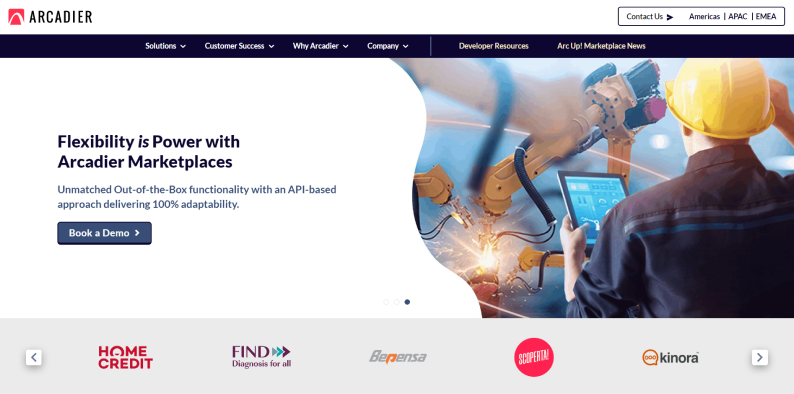
Arcadier is a SaaS-based eCommerce multi-vendor platform. The solution is integrated with APIs to allow business owners to achieve more. Arcadier is well-designed and refined. The recurring payment cycle tenure can be customized as per suitability. The solution has a plugin library to integrate new functionalities.
Key Features of Arcadier multi-vendor platform:
- Third-party integrations
- Private marketplace ÔÇò choose to set approval for sellers or buyers
- Custom Javascript code enabled
- Built-in Analytics support
- Mobile responsive design
- Custom Domain can be applied for.
- In-built modules for user management and listing management.
Arcadier Clients:
Arcadier is a reliable eCommerce solution with clients across 180 countries Some of these are Kinley, PlatformXChain, Snapsquad, and more.
Arcadier Ratings:
The eCommerce marketplace platform has a rating of 3.6 on Capterra. According to the reviews, Arcadier offers a customizable marketplace with good features.
But, client reviews also reveal that customizing the marketplace can be difficult. The additional features are available at an additional cost. In-built templates are ineffective when complex customizations are required.
Arcadier Pricing:
Arcadier comes with a 14-day free trial and a single pricing plan at $99/month. Both monthly and annual billing options are available.
10. X-Cart Marketplace – Self-hosted Multi-vendor Platform
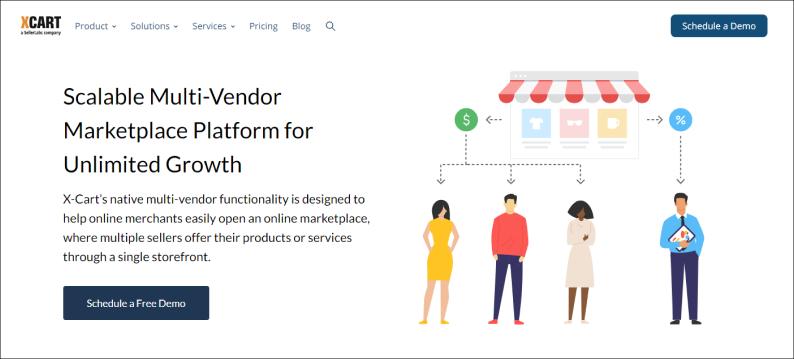
X-Cart is a self-hosted multi-vendor platform that is also open-source. Just like Magento that brings some benefits and some complexities to the table. The solution is customizable and businesses can tailor their launch. Also, if the solution fits the bill for a business, it can be a good long-term choice.
But, being open-source ÔÇò customizations, after-sales, and other essential services need to be managed by the business and which leads to extra development costs.
Key Features of X-Cart Marketplace
- Responsive design ÔÇò the website can be accessed on multiple screen sizes
- Digital products can also be offered alongside physical products
- Customizable and good integration support
- Cloud search also possible
- Real-time shipping prices
- Marketing features
X-Cart Marketplace Clients:
X-Cart has clients across the globe, some of which are Trademark Hardware, Mysterious secrets, and KB Authority.
X-Cart Marketplace Ratings:
It has a rating of 4.2. X-Cart clients are satisfied with X-CartÔÇÖs support for plugins, ease of use, and options for self-hosting.
But, many clients reported a lack of reporting and analytics and unstable updates in the past. Moreover, the clients highlighted the drawbacks like the lack of support for payment gateways like Mpesa and high customization and after-sales charges.
X-Cart Marketplace Pricing:
X-Cart Marketplace pricing starts at $399/month.
11. IXXO Multivendor – Self-hosted Multi-vendor Platform
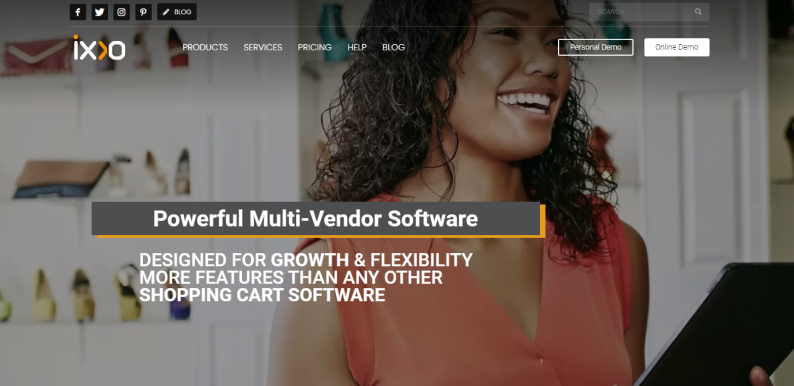
IXXO mutlivendor is another standalone multivendor software that comes with a decent set of features. Although the team also provides a multivendor plugin for WordPress, the standalone solution is an entirely different product.
IXXO multivendor develops its products after research into the industry requirements. This benefit is with the business owners, who get a feature-rich solution.
Key Features of IXOXO multivendor
- Ease of Use
- 24X7 Support
- Shipping management
- Built-In blogging module
- SEO features
- Marketing features
IXOXO multivendor Clients:
Some of IXOXO multivendorÔÇÖs clients are Snakeguides , Cascadiaworkshop, Brainpad, and more.
IXOXO multivendor Marketplace Ratings:
It has a rating of 4.8 on G2. IXOXO multivendor client reviews suggest that it has good number of features. Moreover, the Admin panel is easy to use.
The drawback is the lack of documentation and insufficient sales channels. Further, the clients highlighted the poor after-sales customer service.
IXOXO multivendor Pricing
IXOXO multivendor pricing starts at a one-time fee of $1495 for the Classic pack, $2795 for Business, while Enterprise pack is RFQ.
12. ZielCommerce marketplace solution – Self-hosted Multi-vendor Platform
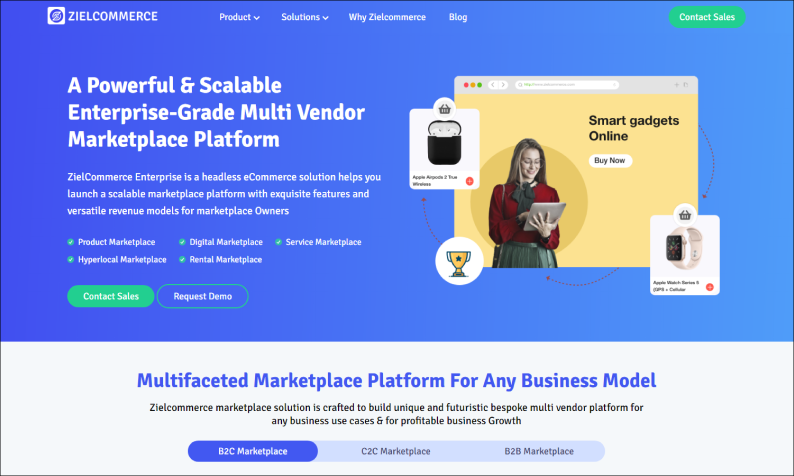
ZielCommerce marketplace solution is a flexible eCommerce platform that allows entrepreneurs to create a marketplace for B2C, C2C, and B2B business models. The marketplaces developed are secure, payment-ready, and tailored to the business requirements.
ZielCommerce has features to manage most eCommerce operations such as shipping, inventory management, payments, and more.
Key Features of ZielCommerce marketplace solution
- Product Catalog Management
- Multiple revenue streams supported
- Vendor Management
- Affiliate Module
- Responsive Design
- Flexible payment terms
ZielCommerce multivendor Clients:
Some of IXOXO multivendorÔÇÖs global clients are Frampo, Briovita, Sprokkets, and more.
ZielCommerce multivendor Ratings:
It has a rating of 4.4 G2. Client reviews suggest the presence of independent Admin panel as easy to use and efficient.
According to the clients, the drawback is the lack of payment gateway customization. Not recommended for large enterprises.
ZielCommerce multivendor pricing
ZielCommerce multivendor pricing is subjective to the needs and is available after requesting for Qoute.
13. Multimerch marketplace solution – Self-hosted Multi-vendor Platform
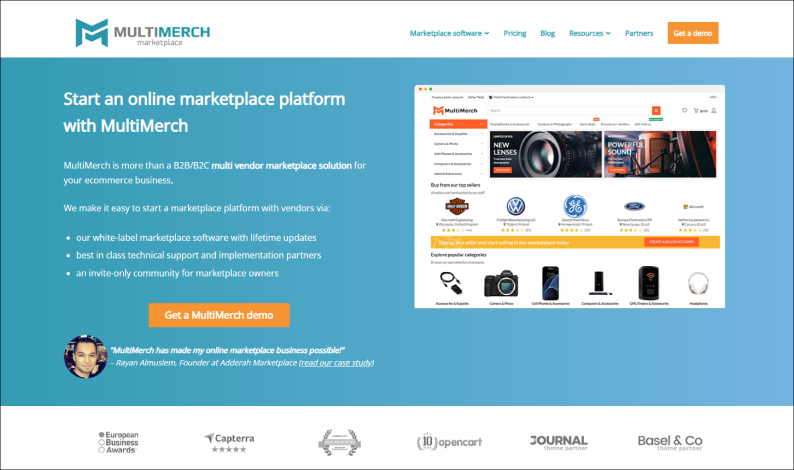
Multimerch marketplace solution comes with rich features for the vendors on the marketplace. The team also offers an invite-only community for marketplace owners.
Multimerch has dedicated dashboards for the Admin and the vendors and also has an efficient payment system on the marketplace. The software caters to both the B2B and the B2C business models.
Key Features of Multimerch marketplace
- Ease of Use
- Dozens of payment gateway integrations
- Inventory management for sellers
- Custom product listing forms
- Customizable Shipping rates
- Direct communication channel between buyers and sellers
Multimerch marketplace Clients:
Some of MultimerchÔÇÖs clients are Roobycon, MieuxEnseigner, Chopni, and more.
Multimerch Marketplace Ratings:
It has a rating of 4.9 on Capterra. MultimerchÔÇÖs client reviews suggest the Admin panel is easy to use, has multiple revenue generation channels, and more.
The drawback is the steep learning curve. Also, there are a few payment gateway integration choices available.
Multimerch Marketplace Pricing
The pricing for the marketplace can be obtained by requesting for quote form the customization partners of the platform.
14. Marketplacer – Platform for Enterprises
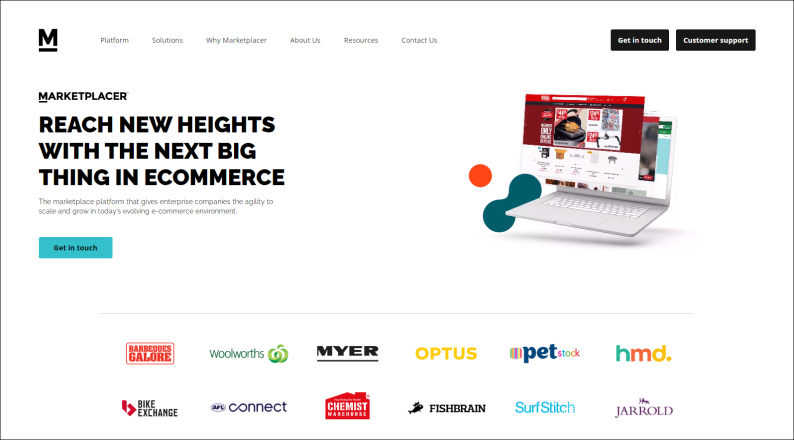
Marketplacer is a platform that is built exclusively for enterprises. They have clients in 10+ countries. Their business offering is based on a scalable solution that can be used to extend business.
Marketplacer goes beyond just providing a solution and also offers other related services to its clients. Moreover, they also offer linking services to sellers of marketplaces
Key Features of Marketplacer
- Sync inventory with Mconnect
- Manage sellers efficiently
- Data Encryption
- Dropshipping Services
- Lead Generation Engine
- Supports multiple third-party integrations
Marketplacer Clients:
Some of MultimerchÔÇÖs clients are Woolworth, Optus, Myers, and more.
Marketplacer Ratings:
It has a rating of 4.9 on Capterra. The client reviews for Marketplacer suggest good customizable options with result-oriented features, good performance, and good customer support. The drawback is that UX writing is specific to Australia and can be ambiguous to American usage.
Marketplacer Pricing
The pricing for the solution has not been revealed on the company website or popular third-party sources.
15. Apurple – eCommerce solutions
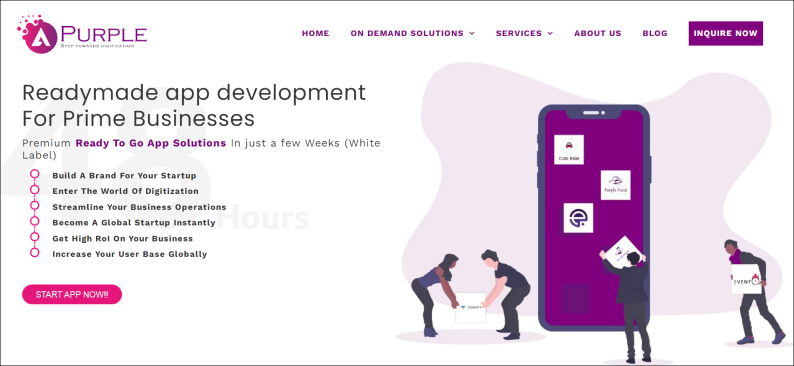
Apurple offers businesses multiple solutions that cater to many niches within the eCommerce industry. With clone scripts, you will be able to build your marketplace like the popular market players the script is based upon.
Apurple adopts a popularly implemented technology stack for its products with some leading open-source technologies. This can render robustness to the solutions.
Key Features of Apurple
- Multi-level Admin access
- Sellers and customer management
- Dedicated dashboards
- Push Notifications
- SEO optimized site
- Payout Preference
Apurple Ratings:
Apurple has a rating of 4.1 on G2. The client reviews for Marketplacer suggest easy-to-use software with a clean interface.
Clients however suggest that the drawback is the software and its services are somewhat slow in performance. Further, the basic pricing is quite expensive and no dedicated support is offered.
16. ShopyGen – Platform for Enterprises
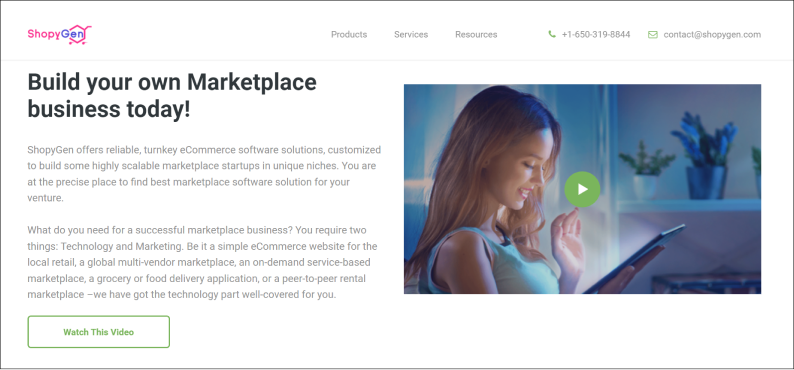
ShopyGen has been built with the MEAN stack, which includes MangoDB, ExpressJs, AngularJs, and NodeJs. These are open-source technologies that provide ease of scalability to the code.
Furthermore, there is also an integrated Facebook chat messenger with the software. This can help marketplace owners to establish a communication channel using one of the most popular social media platforms.
Key Features of ShopyGen
- Robust Admin Panel
- Unique Seller Dashboard
- Newsletter Management
- Facebook Chat Bot
- Host Physical and Digital products
- Supports multiple revenue channels
ShopyGen Ratings:
It has a rating of 4.0 on G2. The client reviews for Genstore suggest an easy-to-use software. The drawback is that price can be high and steep learning curve.
ShopyGen Pricing The pricing for the marketplace software is offered with a two-tiered approach: Genstore Standard at $399 and Genstore Premium at $999.
17. OroMarketplace
OroMarketplace is a multi vendor marketplace software that is made for enterprises. It offers such businesses key inclusions that cater to their specific needs. Moreover, OroMarketplace is built to allow integration with legacy enterprise systems. OroMarketplace also offers a robust built-in CRM that leverages the companyÔÇÖs pedigree in building such solutions.
Key Features of OroMarketplace
- In-built CRM
- Inventory tracking support
- Workflow Engine
- Compatible with B2B and B2C business models
- Scalable API
- Supports multiple revenue channels
OroMarketplace Ratings:
It has a rating of 4.3 on G2. The client reviews for OroMarketplace suggest that software allows greater control over sales and customer service. The drawback is that price can be high and the system is complicated to learn.
OroMarketplace Pricing The pricing for the marketplace software is available on Quote.
18. Mirakl
Mirakl is a flexible SaaS multi vendor marketplace software that can power eCommerce platforms that can power either a B2C or a B2B eCommerce business. The solution is offered by a company based in France. This solution is also positioned more towards enterprises.
The system however lacks key capabilities to sell digital downloadable products.
Key Features of Mirakl
- Advanced product recommendation engine
- Robust Security features
- API first system for seamless integration
- Supports multiple revenue channels
- Intuitive Marketing features
- Comprehensive support and training
Mirakl Ratings:
It has a rating of 4.5 on G2. The client reviews for Mirakl suggest that prices tend to be high, but the eCommerce marketplace solution offers good features for that price. For Enterprises, what they get for that price is favorable. The drawback is that some of the integrations are missing, there is very limited support for digital products, and there is no version available for SMBs.
Mirakl Pricing The pricing for Mirakl is available on quote.
Other Options To Start an Online Multi-vendor Marketplace
1. Use of Multi-vendor Marketplace Plugins
Multi-vendor plugins are add-ons built by third-party developers for Shopify, WordPress, Magento, and other e-commerce platforms. As the name suggests, these plugins can be quickly configured to either start an online marketplace or transform an existing online store into a multi-vendor eCommerce platform. Dokan, WCFM Marketplace, Webkul ÔÇô for instance, are some of the most popular multi-vendor plugins available.
While these plugins save hours of development time for business owners, there are several challenges associated as well, like ÔÇô limited scalability, upgrade costs, persistent performance issues, vulnerability to malware/external threats, and more as shared in clientsÔÇÖ reviews. Moreover, these plugins arenÔÇÖt out-of-the-box multi-vendor solutions like YoKart, CS-Cart, or Sharetribe, which limits a business owner to build an enterprise level multi-vendor marketplace.
2. Multi-vendor Marketplace Development from Scratch
Another option is to build a completely personalized multi-vendor marketplace platform from scratch. This option is suitable for those who have envisioned a unique marketplace idea that cannot be fulfilled with a standalone marketplace builder or plugins. This is because any development from scratch requires a dedicated team of experts, hundreds of thousands of development hours, and is highly expensive (anywhere between $100K to millions of dollars) depending on individual business requirements.
Still, business owners who wish for a multi-vendor store development right from scratch may hire a development team specializing in crafting custom marketplace solutions. Reputed companies like Scnsoft, Rubygarage, and FATbit Technologies follow agile development methodologies to build a custom online marketplace from scratch. These firms have a rating of 4.8, 4.9, and 4.9 on Clutch respectively.
Existing Business and Revenue Models in Multi-Vendor Marketplaces
Integral Business Models: Horizontal and Vertical Marketplaces
Standalone multi vendor eCommerce platforms can easily be aligned to create both horizontal and vertical marketplaces ÔÇô two integral e-commerce business models. Some of the worldÔÇÖs leading online marketplaces or disruptive startups are based on either of the two business models. Alibaba marketplace, for instance, a retail giant that dominates the e-commerce space, follows a horizontal marketplace model. Similarly, the likes of Etsy and Newegg are vertical marketplaces that focus on a specific niche, i.e. vertical marketplace model.
A horizontal marketplace is more extensive catering to more than one industry in a larger market. Such marketplaces have a huge customer base, implement broader policies to cover several product categories, and are highly competitive for a new retailer. Vertical marketplaces, on the other hand, are niche-specific businesses with a well-defined audience. These multi-vendor marketplaces deliver specialized products services, implement a centralized policy across the marketplace, and have less-intensive competition.
Revenue Models for Online Multi-vendor Marketplaces
The marketplace business allows the opportunity to earn via multiple revenue channels. While the majority of online marketplaces operate with one or two revenue methods, in reality, there are several revenue models that a business can adopt. For instance, Amazon has a diverse revenue model which includes commission fees on each transaction, affiliate program, paid advertising space, a subscription-based model with Amazon Prime, and more.
Following is a list of multi-vendor marketplace revenue models:
- Freemium model ÔÇô When a multi-vendor marketplace has both free and premium (paid) features, it is said to be following a freemium revenue model. It is a preferred revenue model by businesses that wish to reach a substantial/sufficient user base. Freemium revenue method offers fast lead generation and unlimited access to the platform. Craigslist, for instance, is a prime example of a marketplace that utilizes the freemium revenue method.
- One-time sign-up fees ÔÇô Another popular revenue method is the one-time seller registration fee charged on the eCommerce marketplace platforms. Here, the admin receives a sign-up fee when a new seller registers in the marketplace. It is a non-recurring charge that a vendor pays to get access to the marketplace.
- Subscription fees ÔÇô When a user (buyer or seller) is charged a recurring fee to access the platform, it is termed as a subscription fee. Many popular multi-vendor marketplaces have a subscription-based model. Amazon, with its Prime membership or Netflix, with its monthly subscription plans ÔÇô are two examples of marketplaces with a subscription-based revenue model.
- Commission Fees ÔÇô It is the most popular revenue model for eCommerce multi vendor platforms. Here, the admin charges a fixed percentage or commission fee on every transaction that occurs in the online marketplace. The admin may charge a commission to either buyer or seller or even both. Upwork, for instance, is an online marketplace that charges commission fees to both freelancers (service providers) and clients (consumers).
- Per delivery fee ÔÇô It is an additional fee associated with the delivery of a product. Amazon ÔÇô the retail giant ÔÇô charges delivery fees to non-prime customers and offers free shipping to prime customers for the majority of orders. While many multi-vendor marketplaces charge a delivery fee, the overwhelming success of Amazon Prime has prompted other marketplaces to rethink their strategy and adapt.
- Selling own products ÔÇô Selling your own products in your e-commerce marketplace makes it a hybrid business model where the third-party sellers are directly competing with your products. Amazon, for example, lists products of its own alongside third-party retailers and generates a major chunk of revenue on the marketplace.
- Featured Ads, Affiliate and other advertisement options ÔÇô Featured listings and banner advertisement is an important revenue generation model in an online marketplace. Marketplace sellers buy advertising privileges to have a featured listing at the top ÔÇô increasing visibility on the multi-vendor marketplace.
Multi-vendor eCommerce Marketplace FAQs
Q1.: Why are multi vendor eCommerce marketplaces more successful?
E-Commerce marketplaces have always been more successful with their extensive variety of products, instant access to a large audience (for sellers), and more revenue generation/growth opportunities for the business owner. It is a lucrative business model for entrepreneurs and enterprises looking for substantial growth.
Q2.: How do I build a multi vendor marketplace swiftly?
To build your multi-vendor website quickly, start by identifying a reliable multi vendor marketplace platform that fulfills your business requirements. Turnkey Multi-vendor eCommerce solutions deliver a ready-to-launch online marketplace, saving both time and money.
Q3.: What features does a Multi-vendor eCommerce Website need to have?
A multivendor eCommerce store requires hundreds of essential features and integrations to streamline store operations. These features vary among marketplace users (admin, seller, and buyer). For instance, an admin or marketplace owner requires features like product catalog, inventory management, abandoned cart recovery, multiple payment gateways, and more. Similarly, for sellers, features like shop inventory, shipping profile management, discount & coupon generation, sales reports, import/export, and others are crucial. Lastly, the multi-vendor ecommerce platform must have these advanced features for buyers like Pay at Store, Multi-lingual, Invoices, Product comparison, etc.
Q4.: Are mobile apps necessary for a multi-vendor store?
As per Statista, more than half of the total website traffic comes from mobile devices and smartphone apps play a significant role here. This makes mobile apps a mandate for a multi-vendor business to maximize its full potential.
Q5.: Are Shopify or BigCommerce Multi-vendor Platforms?
Shopify or BigCommerce are not by-default multi-vendor eCommerce platforms. However, you can use any third-party plugin or app to convert your Bigcommerce or Shopify store to a multi-vendor marketplace.
Q6.: What factors do enterprises need to consider when choosing a multi-vendor platform?
- Time to market – The time required from conceptualization to stable market release is termed as time to market. eCommerce Platforms that deliver ready-to-launch online marketplaces significantly reduce businessesÔÇÖ time to market.
- Scalability – It is the measure of a platformÔÇÖs ability to handle system processing demands by adding new resources or modifying existing ones. For instance, how well a system performs when the traffic increases or how a database handles growing user queries. When choosing a marketplace solution, enterprises should pay close attention to the scalability aspect.
- Customizability – The ability to tweak or customize the multi-vendor marketplace software to incorporate operational needs of the organization. Customizable eCommerce solutions enable enterprises to personalize the marketplace as per their business requirements.
- Expert Technical Support – Bugs/errors in a system can hamper your business performance and impact growth. Hence, it is advisable to choose a reliable multi-vendor platform that offers timely support for any technical concerns at no additional cost.
- Multiple revenue channels – Select a multi-vendor eCommerce solution that supports multiple revenue methods like an affiliate program, seller subscription, commission fee on each transaction, and more.
- SEO Friendliness – An SEO-Friendly marketplace ranks on top of SERPs, enhancing sales and leading to an increased conversion rate. Choose a multi-vendor eCommerce software that offers business owners complete access to SEO tools to optimize the page loading speed, user experience, meta tags, and more in your online marketplace.
These are some of the major factors that differentiate a robust multi-vendor platform from a non-reliable solution. For more details, read the blog on important factors to consider when choosing an e-commerce platform
Q7.: How much does a multi-vendor eCommerce software cost?
The pricing of a standalone multi-vendor marketplace software varies depending upon your business requirements, customization requests, additional integrations required, and more. SaaS multi-vendor software pricing starts at $50-100 per month, whereas licensed multi-vendor ecommerce software pricing starts at $1000-$10000 (one-time fee).
Q8.: How to customize a multi-vendor website?
Customizing a multi-vendor website requires dedicated designing/development hours from a skilled team of experts. To customize an online marketplace, you can either hire the team behind the multi-vendor solution or have an in-house development team do the job for you. Also, you need access to the source code for any kind of customization.
While standalone or licensed based multi-vendor eCommerce platforms offer complete source code ownership that makes it easy to customize. Any customization to a SaaS-based multi-vendor software is limited to the list of add-ons available and anything beyond it is either not possible or is truly expensive to be built.
Q9.: How to attract sellers to a multi-vendor website?
Pre-planning your initial marketing strategy or assessing your options is a fundamental approach towards attracting sellers to a multi-vendor marketplace website. For instance, creating a ÔÇ£coming soonÔÇØ landing page, using social media marketing, or advertising on online ad networks – there are several steps that can help with your seller onboarding.
Q10.: How to market a multi-vendor marketplace website?
SEO (Search Engine Optimization) can be the first step when your multi-vendor marketplace website is live. Create meta tags, schema code, alt tags, and make other on-page SEO changes to make the website search-friendly. You can start writing blogs on your website and third-party channels to build brand awareness and traffic. Plus, keeping your target audience in mind, you can start doing paid advertising on channels like Google Shopping Center, Facebook, or Instagram.
Other Multi-vendor eCommerce Related Articles
Lastly, if you still have questions or need relevant information regarding multi-vendor business models, marketplace solutions, or vendor onboarding process, here are a few suggested articles to read:
- Top Online Multi-Vendor Marketplace Business Ideas
- Why Vertical Online Marketplace Model Gaining More Popularity Over The Horizontal Model?
- SaaS-Based vs Licensed based | Which eCommerce Multivendor Platform Is Right For Your Business?
